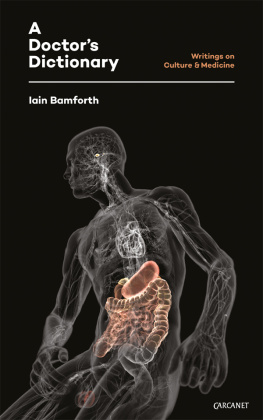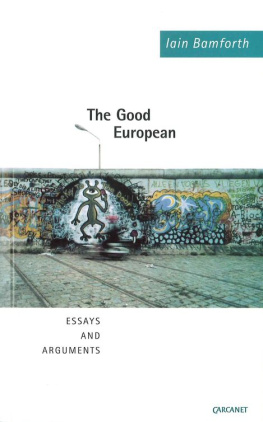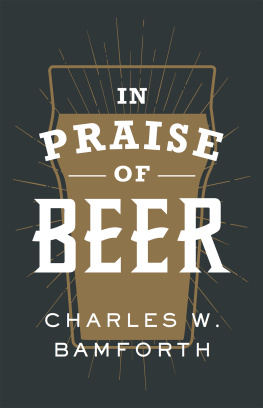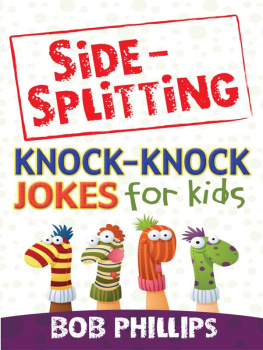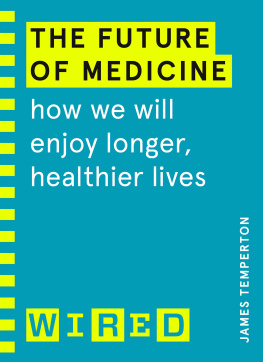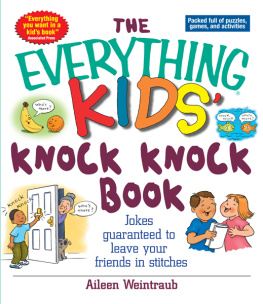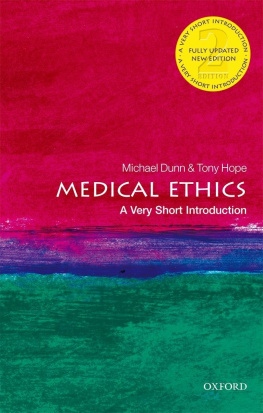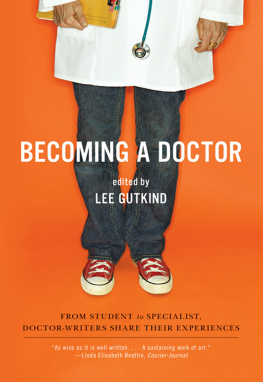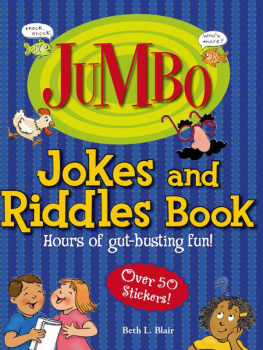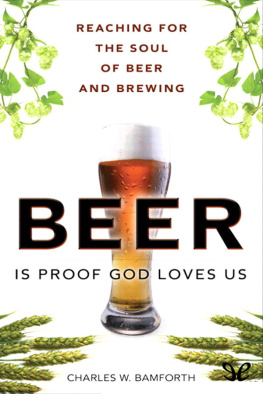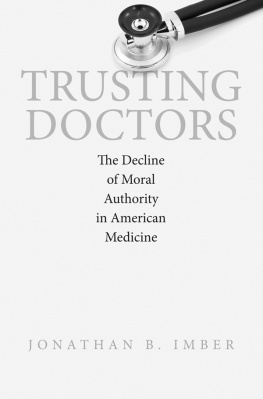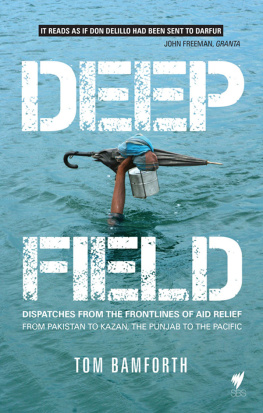IAIN BAMFORTH
A Doctors Dictionary
Writings on Culture & Medicine

Hast du Verstand und ein Herz, so zeige nur eines von beiden,
Beides verdammen sie dir, zeigest du beides zugleich.
Friedrich Hlderlin, Guter Rath, 1797
Contents
Preface
Anyone who decides to live on the continent (as only the British refer to it) has to expect to live part of the time in the subjunctivethe verbal mood for anything thats hypothetical or contingent. You cant hope to get by as a competent speaker of French or German (where it is called Konjunktif ) unless you know how to enter the parallel world of things that demand someone elses participation or consent, or the special time or set of circumstances to be agreed upon before a possibility can swell into the indicative. Verbs of wishing, fearing, expressing judgement and emotion all take the subjunctive mood. The subjunctive is for people who like parentheses and extrapolations. The great Austrian novelist Robert Musil wrote an entire novel set in the subjunctive, and never emerged in the indicative to finish it.
The subjunctive exists in English too, but its presence is vestigial and barely observed. Instead we have The Life and Opinions of Tristram Shandy, Gentleman, Laurence Sternes seriously funny tribute to the zigzag. His novel was once described as a congeries of unconnected rhapsody, rambling digression, eccentric humour, peculiar wit, petulance, pruriency and ostentation of learning; it exhibits all those qualities, and it has also been one of the most influential European novels ever. It mocks what it loves, not least the encyclopaedic impulse; Tristrams father has a system of education collecting first for that purpose his own scattered thoughts, counsels, and notions, and binding them together. This is his TRISTRA-paedia.
I took a leaf from Tristrams fathers system by arranging these twenty-six essays as an abecedary of concept-terms, which is about as much order as I could give to my life. Two of these headings are not even English in origin, which is appropriate enough, and Posture has a wider purchase in French, where tre en mauvaise posture is to be in a tricky situation. My Book of Patience includes magical and not so magical bodies, eyes and ears, nose and teeth, old-style livers and the latest pills, happiness quotients and fake doctors, Chekhov and Roget, mining towns and poison trees, Swiss sanatoria and penal colonies, and bacteria almost everywhere. Some of the concept-terms could, conceivably, have been quite different: Happiness, for instance, displaced another article on Hands, which used to be important diagnostic extensions for doctors. The War of Eye and Ear was catalogued under Visions until I realised that the real concern of the essayin spite of what Louis-Ferdinand Cline said in a 1957 interview about our species being terribly dull-witted, thick or just a drag (extraordinaire de lourdeur)is the increasing weightlessness of our experience, as if we were mere bundled spoors of hygiene and charisma; this made room for the Vertigo of Stendhals syndrome, which could be anything from the mildest vasovagal episode to major psychotic decompensation.
My title A Doctors Dictionary is a reminder, at least to myself, that more of my professional life than I might have wanted has been spent in the precincts of weighty books, not least in France, where the unexpected difficulties of making a living as an omnipraticien (general practitioner) in Strasbourg led to my becoming a scientific translator and editor. Many of these books have been dictionaries, lexicons and encyclopaedias, although with digitalisation much of their bulk and mustiness has volatilised. To be fascinated by the extractive industries, like the early Romanticsheightened for me by a year in a gritty but fascinating Australian mining townis perhaps a kind of nostalgia for bodily experience, and all its effort and fatigue, now that digitisation, seemingly in league with capital, has embarked on the process of hollowing out all that is solid even more drastically and purposefully than in Marxs time: there are very few jobs and professions that have not yielded to the computerisation of what they entail.
Losing touch is something that threatens us all. The implications for medicine are serious, when this ancient professionnever entirely a science and no longer quite the art it used to be, but an empirical discipline aided by, and increasingly in thrall to, technologyforgets what it owes to tact. Doctors are translators, interpreters and sign-readers, sure; but sometimes their simple presence counts for something else, as the resident asks Robert Lowells persona in his late poem: We are not deep in ideas, imagination or enthusiasmhow can we help you?
Acknowledgements
All of these pieces, with one exception, were first published in journals and periodicals, some as commissioned reviews, others as commentary pieces that I cajoled the editors into publishing. Some of them still bear the cauls of their first emergence, but generally Ive attempted to coat and shoe them as literary essays, able to stand on their own while taking their place in this books AZ schema of things. Some first saw light as occasional pieces in the British Journal of General Practice, and I acknowledge a debt of gratitude to Alec Logan, its deputy editor, who for many years kept asking me to provide a feature on medicine and writing for the Christmas edition of the journal. I am also grateful to the editors of Times Literary Supplement, London Review of Books, Medical Humanities, PN Review, Parnassus, Quadrant, The Linguist, Laphams Quarterly, British Medical Journal, The Lancet and the Bulletin of the World Health Organization for allowing me to develop and republish articles from their pages. Crise de Foie first appeared in German translation in the weekend feuilleton of the Sddeutsche Zeitung thanks to the efforts of my father-in-law, Christian Schtze, who also translated it.
A number of the essays in this book constituted a good part of the manuscript Medicine and the Imagination submitted to the University of Glasgow in 2009 for the degree of Doctor of Letters by publication. I would like to thank Michael Schmidt and John Coyle for alerting me to the existence of a Scottish Universities by-law the terms of which were previously unknown to me, and for their encouragement, and not least that too of my external referees Kenneth Boyd and Peter Davidson, whose appraisals reassured me that I wasnt entirely on a hiding to nothing.
Thanks are also due to my helpful friend Richard Price at the British Library, and to staff at my local institute, Strasbourgs newly refurbished National and University Library (BNUS)a magnificent Italianate edifice built in the Wilhelmine period when Strasbourg was Strassburg and second now in France in terms of its collections only to the National Library in Parisis a precious resource for me as an expatriate writer. Further thanks are also due to colleagues and friends in medicine and the wider world, with whom I have discussed some of the issues raised in this collection at various times: Olivier Wong, Frank Slattery, Douglas Shenson, Carl Elliott, Bruce Charlton, John and Mary Gillies, Jeremy Garwood, Christopher Harvie, Christine and Richard Thayer, David Bellos, Jim Campbell, Gerald Mangan, Les Murray, Alberto Manguel, Frederic Raphael, Marjorie Farquharson, Desmond Avery, Brian Hurwitz, William Ian (Bill) Miller, Peter and Maria McCarey, as well as to my editors at Carcanet Helen Tookey and Luke Allan. I would like to thank Lewis Lapham for commissioning me to write a reappraisal of

